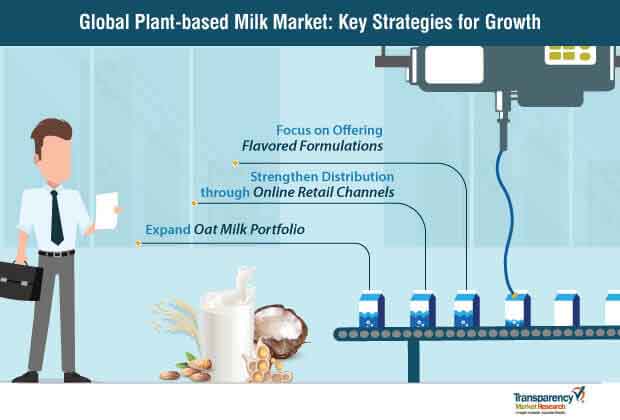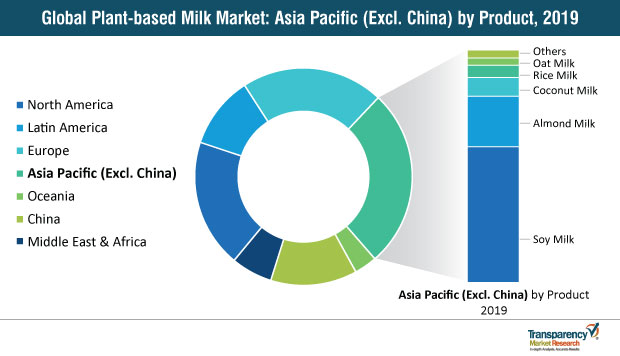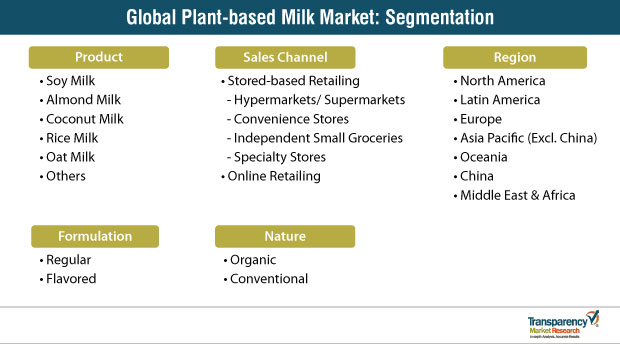
Once presaged as an essential aspect of a balanced diet in several cultures, dairy usage in some categories has witnessed a decline over the past two decades, as consumers respond to the worries over hormone usage, allergens, and the perceived unhealthy profile of some dairy offerings. This has transformed the landscape for dairy producers, globally, as they work towards keeping pace with the evolving consumption attitudes and the distinctions in consumer attitudes from region to region, while cashing in on the potential opportunities in dairy product consumption. Dairy alternatives such as plant-based milk have a perceived health halo among consumers, capturing the attention of dairy product providers.
Transparency Market Research (TMR) recently published a report on the plant-based milk market, in which, analysts showcase a positive viewpoint of the industry on account of changing consumption patterns and the growing preference for sustainable, organic, and plant-based foods. The study unveils the key elements driving market growth, while highlighting the developments made by market competitors.

Tracing the Evolution of the Plant-based Milk Industry
Humans first imbibed the idea of the consuming milk of other mammals following the domestication of animals during the Neolithic Revolution.
Although milk held a legacy of strong market hold over centuries, the preference for plant-based milk has also been there over centuries, although not regarded as a substitute for dairy milk. Recipes from Levant, back in the 13th century, describe the first-ever plant-based milk—almond milk, whereas, soy milk was another plant-based milk consumed in China during the 14th century. Medieval England also marked the use of almond milk in several dishes.
In the recent past, these products gained recognition under the plant-base category, ever since consumer perception transformed and the preference for dairy alternatives grew. The plant-based milk market is expected to record a revenue of ~ US$ 14 Bn in 2019, and is expected to grow at a CAGR of ~ 8% through the forecast period.
Plant-based Milk Market: Impact of Undercurrents
Consumers Opting for Label-friendly Products
The clean label trend shows no signs of slowing down, with the consistent urge of consumers to reformulate products with no synthetics and artificial additives. As the demand for ‘clean label’ products continues to escalate, the consumption of plant-based milk is expected to grow.
Demand for Plant-based Nutrition Sources
As millennials and Generation Zers explore sustainable, healthy plant-based alternatives to conventional staples such as milk, providers hope to cash in on this trend. The demand for plant-based protein sources has escalated significantly, resulting in significant preference for plant-based milk. The interest in veganism is soaring, especially among millennials, wherein, a significantly larger consumer base is making healthier choices. This has offered growth opportunities for plant-based milk market competitors.
Growing Levels of Lactose Intolerance
The growing levels of lactose intolerance have propelled consumers to opt for dairy-free alternatives. Several recommendations by governments and health organizations are directed towards the effective management of lactose intolerance, one of which is preferring lactose-free milk and dairy products, thereby accelerating the growth of the plant-based milk market.
Although plant-based milk is gaining immense popularity among health-conscious consumers, the relatively lower level of protein present in these dairy alternatives is likely to impact the overall consumption of the product. Another challenge faced by plant-based milk providers is the tedious process of legal and regulatory inspection, as industry associations prevent manufacturers from using labels that could misguide consumers regarding the nutritional value of the product.

Plant-based Milk Market: Key Strategies for Growth
Focus on Offering Flavored Formulations
Companies serving the plant-based milk market are centering their focus on flavored formulations to entice consumers, particularly the younger generation. Although there is notable consumption of regular plant-based milk formulations by consumers, companies aim to differentiate themselves from their competitors by focusing on flavored formulations. For example, Danone provides a range of flavored plant-based milk products, for which the company combines industry expertise and research capabilities to innovate flavors.
Strengthen Distribution through Online Retail Channels
The role of e-Commerce in proliferating the sales of food and beverage products continues to be in the focus of manufacturers. Distribution through online platforms is becoming a profitable strategy for companies, as e-Commerce has made it easy for companies to reach consumers. Furthermore, increased smartphone penetration further supports this aspect. Although food and beverage offerings are penetrating retail stores, companies continue to emphasize on permeating online retail platforms to cash in on the opportunities held by e-Commerce.
Expand Oat Milk Portfolio
Oat milk is a consumer-friendly and planet-friendly plant-based milk product, having a smaller carbon footprint as compared to dairy milk. Moreover, as consumer thirst for oat milk continues to surge, some dairy farmers producing non-dairy milks are proliferating the production of oat milk. As the TMR study demonstrates oat milk as a high-growth market, expansion of the oat milk portfolio remains a profitable strategy.
Scrutinizing the Competitive Scenario
In 2019, Danone’s Silk brand unveiled an oat-based beverage product – Oat Yeah – which is milk alternative. The launch of this product was attributed to falling soy milk sales.
In 2019, Blue Diamond, a grower-owned cooperative firm and the world’s leading almond marketer and processor, expanded its extensive Almond Breeze product line with the addition of a dairy-free product favored by Latin Americans – Almond Breeze Almondmilk Horchata.
Considering the present scenario, the plant-based milk market remains consolidated in nature. However, it is expected to become fragmented during the forecast period. Large companies are diversifying their existing portfolios and upgrading their production facilities to ensure that they are fully-equipped to cater to the growing consumer demand for plant-based milk. Plant-based product providers are regularly offering consumers more innovative products, including unique ingredients and flavors. Innovation in plant-based milk helps meet the evolving consumer demand for healthier beverages, without compromising on the taste, texture, flavor, and nutritional qualities of the product.

Analysts’ Perspective of the Plant-based Milk Market
Consumers’ reconsideration regarding the consumption of animal proteins and dairy, on health, environmental, and ethical grounds, has led to the cutting out of dairy. As a result, the plant-based milk industry is witnessing a boom. Owing to this, TMR’s analysts have a positive perspective of the market. Although APAC (Excl. China) is expected to be remain the leading plant-based milk market, Latin America is projected to showcase high-growth. Owing to this, market entrants planning geographical expansion could consider the lucrative Latin American market for plant-based milk. Moreover, as consumers are becoming more inclined towards products that are simple and those that contain less or no artificial ingredients, plant-based milk of organic nature is likely to be a promising avenue for businesses.
Plant-based Milk Market Witnessing Growth Due to Radical Shift towards Veganism
– Veganism is stimulating the global demand for plant-based milk. According to a survey presented by the Vegan Life Magazine and Vegan Society conducted amongst almost a billion people across Europe.
. At least 542,000 people in the U.K. are following a vegan diet, which is an increase of around 300% in the last decade, with 42% of the people aged between 15 and 34.
. Also, according to the research conducted by TMR, in the U.S., the number of buyers documented as vegan increased from 1% to 6% between 2014 and 2018. Tuning the demand for better and tastier vegan products is an opportunity for growth.
Soy to Remain the Most Preferred Source of Plant-based Milk
– The rising number of lactose intolerant population and health-conscious people is driving the demand for soy milk and other plant-based milk product types. Growing concerns over the adverse effects of natural milk and leaning towards non-dairy milk have been observed. Soybean growers have a brilliant prospect to exploit on.
– Plant-based milk is obtained from soy, almonds, coconut, rice, oats, hemp, and cashew nuts, among others. North America and Europe are anticipated to gain substantial market share throughout the forecast period. The acceptance of veganism is increasing; and more and more new companies are cropping up, and prevailing companies are introducing new plant-based milk products to keep up with this recent trend.
Plant-based Milk – A Profitable Business Opportunity
– TMR’s research finds that, the plant-based milk market was valued at ~ US$ 14 Bn in 2019, and is estimated to record ~ 8% Y-o-Y growth during the forecast period. The plant-based milk market is expected to be a profitable business for combating the global demand for plant-based milk. The plant-based milk market is also restoring veganism, as manufacturers are opting for alternative sources such as plant-based products.
– The dairy industry is expected to witness major transformation in the near future, with increasing population, consumer mindfulness, and the increasing trend towards cruelty-free products. All these factors are raising the global demand to bring more plant-derived products to plates, including plant-based milk.
Change in Perception over Plant-based Products and Plant-based Milk
– The increasing shift in consumer preference for plant-based food products in daily diets is anticipated to drive the market of plant-based milk. Consumers are becoming more inclined towards products that are simple and contain less or no artificial ingredients. Thus, manufacturers need to review and update their product offerings and find ways to substitute or eliminate ingredients that have an undesirable effect on the health of consumers.
– Consumers in the U.S. and Europe are becoming more proactive in using plant-based milk, food, and beverages, reducing the risk of diseases that are associated with the consumption of meat and dairy products. This is expected to support the growth of the global plant-based milk market.
– Rising concerns regarding health and wellness, and the increase in obesity, diabetes, and other cardiovascular diseases among consumers have made them consider and ascent towards vegan or plant-based products, including plant-based milk. Plant-based milk aids a healthy lifestyle and balanced diet, and offers improved nutritional value, vitamins, minerals, and healthy fats in comparison to products from the dairy industry.
– Consumers are choosing safer milk products such as plant-based milk due to increasing food safety concerns related to the practice of using hormones and antibiotics in the dairy Industry.
According to a report by The Humane Society of the United States (HSUS), there is an ever increasing demand for animal-derived products from animals raised without any kind of antibiotics and hormones. The cumulative ingestion of antibiotics and hormones in livestock may unfavorably affect human and animal health.
Health Benefits of Plant-based Milk and Increasing Demand for Plant-based Protein Sources to Drive Sales
– Noting the booming demand for natural products and the quick development of new providers, well-known huge consumer goods companies are proceeding by positioning their own natural divisions or by acquiring smaller brands in the market. Traction in the production of animal-free proteins will drive the growth of the plant-based milk market.
Growing Plant-based Food and Beverage Industry Boosting the Plant-based Milk Market
– The sales of plant-based food products in the U.S. increased by a noteworthy rate of around 8-10% in 2019, with earnings of more than US$ 3 billion. Plant-based dairy products are expected to denote around 40-45% of overall dairy alternatives. Dairy alternative products showed an impressive 61% surge in sales in the last year, reaching a value of around US$ 15 billion. Due to all these factors, noteworthy grip is predicted to be seen in the dairy alternatives market in the future.
Plant-based Milk: Market Players
Key players operating in the plant-based milk market, as profiled in the study, include
– Groupe Danone.
– Pacific Foods of Oregon, Inc.
– The Hain Celestial Group Inc.
– Turtle Mountain LLC.
– Vitasoy International Holdings Limited.
– Natura Foods, Sunopta Inc.
– Freedom Foods Group Ltd.
– Earth’s Own Food Company Inc.
– Mc Cormick & Co., Goya Foods.
– The Hershey Company.
– Blue Diamond Growers, Inc.
– Edward & Sons.
– Chef’s Choice Food Manufacturer Company Limited.
– Alpina Foods.
– Liwayway Holdings Company Limited.
– The Bridge s.r.l. Kaslink Foods Oy Ltd.























